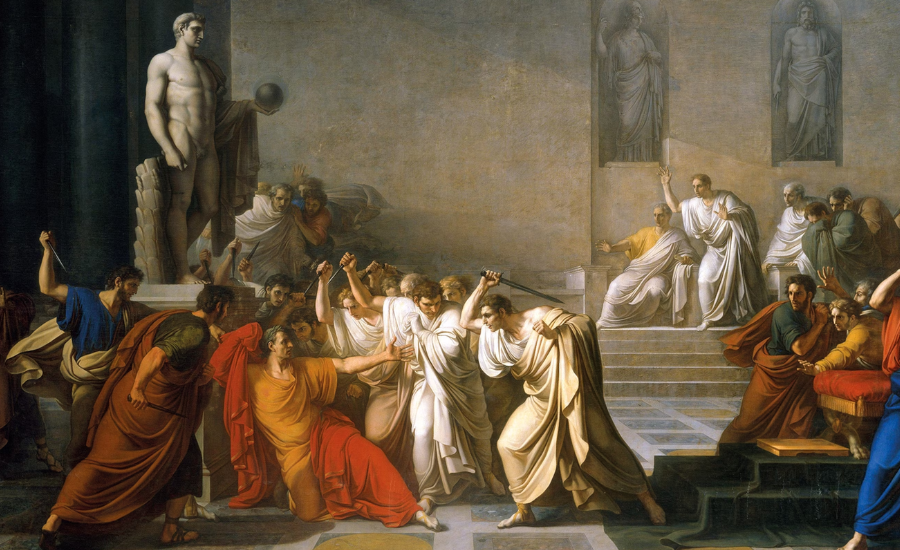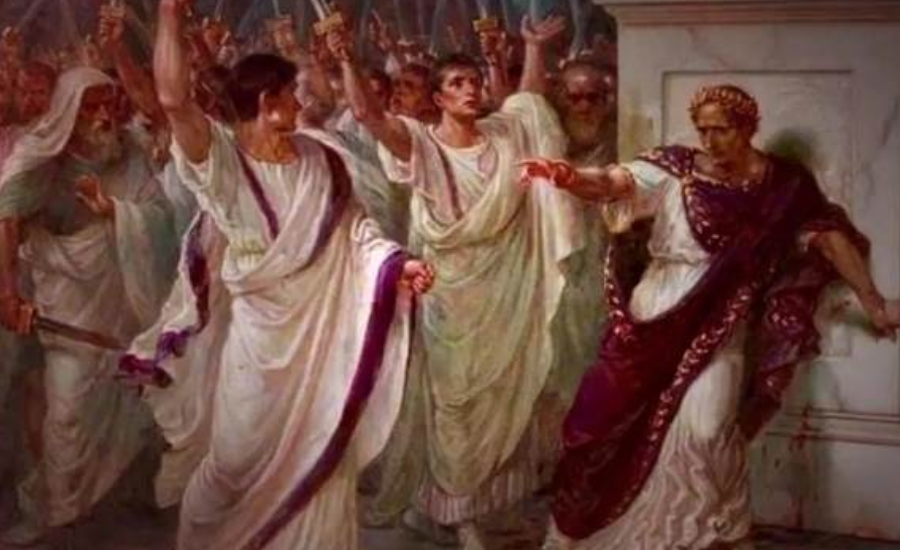Brútus and the Decline of the Roman Republic: An In-Depth Historical Analysis
Introduction
In the chaotic epoch of ancient Rome, where democracy clashed with burgeoning dictatorship, one figure stands out as both a contentious symbol of defiance and a celebrated hero: Marcus Junius Brutus. His life story encapsulates the intense political strife of his era, reflecting the turbulent transition from republican ideals to autocratic rule. Brutus, born into an esteemed Roman family, was steeped in the values and principles of the Republic from a young age. His journey, marked by bravery, betrayal, and an unwavering commitment to his ideals, is most notably defined by his involvement in the assassination of Julius Caesar. This exploration examines Brutus’s profound cultural and historical impact, highlighting how his actions have influenced the broader narrative of resistance against tyranny and the quest for political integrity. By analyzing Brutus’s legacy and its evolving interpretations, we gain deeper insight into the themes of valor and resistance that continue to resonate through history.
Historical Context of Brutus

The Roman Republic Era
Marcus Junius Brutus came to prominence during a pivotal era in ancient Rome known as the Roman Republic. This era, spanning from the late 6th century BCE to the rise of the Roman Empire, was characterized by a complex system of governance and a unique social structure. Central to this system was the election of two consuls each year, who wielded executive power and were accountable to the Senate and the Roman citizenry.
Despite its democratic ideals, the Roman Republic was often marred by political instability and fierce rivalries among competing factions. The delicate balance of power was frequently disrupted by internal conflicts, corruption, and the ambitions of powerful individuals. This turbulence highlighted the challenges inherent in maintaining a republic amidst growing demands for centralization and control.
Brutus’s distinguished lineage played a significant role in his political identity. As a descendant of Lucius Junius Brutus, a key figure in the establishment of the Roman Republic, Marcus Brutus inherited a legacy of valor and commitment to republican principles. His engagement in politics was marked by his exceptional skills as a strategist and orator, which earned him widespread acclaim.
Brutus’s steadfast resistance to authoritarianism and his fervent dedication to preserving the values of the Republic defined his political career. His reputation as a champion of republican ideals was further solidified by his role in the dramatic events leading up to Julius Caesar’s assassination. This period of Roman history underscores the complexities and contradictions of republican governance and the enduring struggle to balance power and liberty.
Julius Caesar’s Rule
Marcus Junius Brutus is perhaps most famously associated with his involvement in the assassination of Julius Caesar in 44 BCE. At this juncture, Caesar had amassed considerable power and effectively concentrated authority in his own hands, thereby undermining the Roman Republic’s foundational democratic principles.
Caesar’s consolidation of power was perceived by Brutus and his fellow conspirators as a direct threat to the Republic’s democratic framework and its traditional liberties. In their view, Caesar’s increasingly autocratic rule jeopardized the core values of Roman governance, prompting them to take drastic action. They believed that by eliminating Caesar, they would restore the Republic and its political balance.
However, the aftermath of Caesar’s assassination did not lead to the restoration of the Republic. Instead, it plunged Rome into a period of intense civil strife and political chaos. The power vacuum left by Caesar’s death resulted in further conflict among rival factions, ultimately leading to the rise of Caesar’s heir, Octavian (later Augustus), and the establishment of the Roman Empire.
In the final stages of this tumultuous period, Brutus faced defeat and was ultimately forced to take his own life to avoid capture by his adversaries. Despite the failure of the conspiracy to achieve its intended goals, Brutus remains a pivotal figure in Roman history. His actions have come to symbolize a profound commitment to resisting tyranny and defending democratic ideals. Brutus’s legacy endures as an inspiration for those who seek to challenge autocratic rule and advocate for political reform, resonating through various revolutionary and political movements across the centuries.
Biography of Brutus

Early Life
Marcus Junius Brutus was born in 85 BCE in Rome, into a prominent and influential family. His father, also named Marcus Junius Brutus, served as a senator, while his mother, Servilia Caepionis, came from a distinguished noble lineage. This privileged background afforded Brutus a high-quality education, which fostered his early passions for philosophy and literature. His intellectual pursuits and exposure to the ideals of the Roman Republic would later play a crucial role in shaping his political beliefs and career.
Political Career
Brutus’s political ascent began in 58 BCE when he served as a military tribune under Julius Caesar during the latter’s campaign in Gaul. This experience not only honed his military skills but also exposed him to the intricacies of Roman politics and governance. Over the years, Brutus advanced through the political ranks, becoming a praetor and later serving as the governor of Cisalpine Gaul.
In 49 BCE, Brutus was appointed governor of Cyprus, a position that further solidified his reputation as a capable and influential political figure. His administrative roles and political activities provided him with significant experience and insight into the governance of the Republic.
By 44 BCE, Brutus found himself deeply engaged in a critical and covert operation: the conspiracy to assassinate Julius Caesar. Viewing Caesar’s accumulation of power as a grave threat to the Republic’s democratic values, Brutus, alongside his fellow conspirators, believed that Caesar’s removal was crucial to safeguarding Rome’s political system.
On the Ides of March in 44 BCE, Brutus and his co-conspirators carried out the assassination of Julius Caesar in the Roman Senate. This dramatic and historic act was driven by Brutus’s commitment to preserving the Republic’s ideals, despite the personal and political risks involved.
The Assassination of Julius Caesar
The assassination of Julius Caesar on March 15, 44 BCE, represents a dramatic turning point in the annals of Roman history. This audacious act by Marcus Junius Brutus and his co-conspirators marked the collapse of the Roman Republic and heralded the rise of the Roman Empire. Caesar’s consolidation of power had increasingly threatened the Republic’s democratic framework, prompting Brutus and others to take drastic measures in an attempt to restore the traditional republican values.
In the immediate aftermath of Caesar’s death, Brutus and his fellow conspirators found themselves in a precarious position. Facing retribution from Caesar’s supporters, they were forced to flee Rome to escape the wrath of those loyal to Caesar. Despite their initial hopes of reinvigorating the Republic, their efforts quickly faced formidable opposition.
Brutus’s subsequent endeavors to challenge the power of Caesar’s successors, Mark Antony and Octavian (the future Emperor Augustus), proved unsuccessful. The conflict culminated in a failed revolt against these formidable leaders. The power struggle that ensued ultimately led to the establishment of the Roman Empire, with Octavian emerging as its first emperor.
The fallout from the assassination deepened the political instability in Rome, setting the stage for further conflict and the eventual transformation from a republic to an empire. Brutus’s actions, though ultimately unsuccessful in their immediate goals, underscore the intense political struggles of the time and have become emblematic of the tension between republican ideals and autocratic power.
Brutus in Literature

Shakespeare’s “Julius Caesar”
In William Shakespeare’s renowned play “Julius Caesar,” the character of Brutus is depicted as a noble Roman senator torn between his allegiance to Julius Caesar and his dedication to the Roman Republic. Persuaded by the scheming Cassius, Brutus becomes a key conspirator in the assassination of Caesar, driven by the belief that removing Caesar would safeguard Rome’s democratic ideals. Despite his well-meaning intentions, Brutus is soon overwhelmed by feelings of guilt and inner turmoil following the murder.
Shakespeare’s portrayal of Brutus is widely acclaimed for its depth and complexity. The character’s profound moral conflict and the weight of his decisions are central to the play’s dramatic tension, offering rich material for both critical analysis and audience engagement. Brutus’s internal struggle and the tragic consequences of his actions contribute significantly to the play’s enduring impact and relevance.
Later Portrayals
Brutus’s representation extends beyond Shakespeare’s work into a variety of literary and artistic contexts. In Dante Alighieri’s epic poem “The Divine Comedy,” Brutus is relegated to the lowest circle of Hell, punished alongside other notorious traitors. This depiction reflects the severe moral judgment passed on Brutus’s betrayal.
Robert Graves, in his historical novel “I, Claudius,” presents Brutus as a shrewd and politically astute figure whose actions play a pivotal role in the decline of the Roman Republic. Graves’ interpretation highlights Brutus’s political maneuvering and its significant repercussions on Roman history.
In modern literature, Brutus’s legacy takes on new forms. In Suzanne Collins’ “The Hunger Games” trilogy, a character named Brutus is a formidable tribute from District 2, known for his ruthlessness in the deadly arena. Additionally, in the comic book series “Astro City,” Brutus is reimagined as a superhero within a villainous team known as the Terrible Trio, showcasing the character’s versatility across genres and media.
Cultural Impact

Symbol of Betrayal
Marcus Junius Brutus has become a profound symbol of betrayal in Western culture. His name is often invoked to describe a traitor or someone who betrays a trusted friend or ally. This association originates from his central role in the assassination of Julius Caesar in 44 BCE, an act that profoundly disrupted Roman politics and symbolized a dramatic breach of trust. Shakespeare’s play “Julius Caesar” has significantly reinforced this image, portraying Brutus as a tragic figure whose lofty ideals are ultimately overshadowed by his betrayal of Caesar. The portrayal in the play emphasizes the tragic irony of his actions, highlighting the complexity of his character and the consequences of his decisions.
Influence on Art and Media

The legacy of Brutus extends widely into art and media, where he is a frequent subject of various creative forms. His dramatic involvement in Caesar’s assassination has been depicted in numerous paintings, sculptures, and other artistic representations. These works often focus on the intensity of the historical events and Brutus’s conflicted role in them.
In contemporary media, Brutus appears in a diverse array of films, television series, and literary works. These portrayals vary widely, from sympathetic interpretations that highlight his moral struggle and noble intentions to critical perspectives that emphasize his role as a betrayer. This diversity reflects the complex nature of Brutus’s legacy and his impact on storytelling across different genres and mediums.
Legacy and Memorials
Brutus’s enduring legacy is marked by themes of bravery and resolve. He is celebrated as a figure who stood firmly for the principles of liberty and republican values, despite the tragic outcomes of his actions. This legacy is honored through various memorials, including statues and plaques dedicated to his memory. One notable monument is the Brutus Memorial, located in the capital city, which features a grand statue of Brutus armed with a sword and shield, symbolizing his commitment to his cause.
Beyond physical monuments, Brutus’s influence is also celebrated through cultural traditions and commemorative events. Annually, on the anniversary of his death, a festival is held to honor his heroism and reflect on his contributions. This event brings people together to celebrate his legacy and discuss his impact on history.
Brutus’s story continues to inspire and resonate, symbolizing resistance and the fight for justice. His narrative appears across a range of books, films, and songs, perpetuating his legacy and encouraging new generations to confront and challenge injustice.
Related: ypk22x
Summary
Marcus Junius Brutus stands out as a pivotal figure in the decline of the Roman Republic, embodying the turbulent transition from democratic ideals to autocratic rule. Born into a distinguished Roman family in 85 BCE, Brutus was steeped in republican values from a young age. His involvement in the assassination of Julius Caesar in 44 BCE, driven by a belief that Caesar’s power threatened the Republic’s democratic principles, became a defining moment in his life and in Roman history.
The Roman Republic, characterized by its complex governance and frequent internal conflicts, was a backdrop for Brutus’s political career. Despite his noble intentions, Brutus’s attempt to restore the Republic ultimately failed, leading to further civil unrest and the rise of the Roman Empire under Octavian (Augustus). His legacy, though marked by failure, remains a symbol of resistance against tyranny and dedication to political integrity.
Brutus’s life and actions have been explored extensively in literature and media. Shakespeare’s play “Julius Caesar” portrays him as a tragic hero, while later works, including Dante’s “Divine Comedy” and Robert Graves’s “I, Claudius,” present varied interpretations of his character. In contemporary culture, Brutus appears in diverse contexts, from dystopian fiction to superhero comics, reflecting his complex legacy.
Brutus’s cultural impact includes his symbolic association with betrayal and his representation in art and media. His legacy is commemorated through memorials and cultural traditions, celebrating his commitment to liberty and resistance against autocratic rule.
FAQs
1. Who was Marcus Junius Brutus?
Marcus Junius Brutus was a Roman senator and key conspirator in the assassination of Julius Caesar. Born in 85 BCE, he was part of a distinguished family and became known for his commitment to republican values. His involvement in Caesar’s assassination aimed to protect the Republic’s democratic principles.
2. What was Brutus’s role in the assassination of Julius Caesar?
Brutus played a central role in the conspiracy that led to Julius Caesar’s assassination on March 15, 44 BCE. He and his fellow conspirators believed that Caesar’s growing power threatened the Republic’s democratic framework and decided that eliminating him was necessary to restore political balance.
3. What were the consequences of Caesar’s assassination?
The assassination of Julius Caesar led to significant political instability and civil unrest in Rome. Rather than restoring the Republic, it created a power vacuum that contributed to the rise of Caesar’s heir, Octavian (Augustus), and the eventual establishment of the Roman Empire.
4. How is Brutus depicted in literature?
In Shakespeare’s play “Julius Caesar,” Brutus is portrayed as a noble but conflicted figure who betrays Caesar despite his good intentions. Other literary works, such as Dante’s “Divine Comedy” and Robert Graves’s “I, Claudius,” present varied interpretations of Brutus, reflecting his complex legacy. Modern adaptations include portrayals in books, films, and comics, each adding to the multifaceted view of his character.
5. What is Brutus’s cultural impact?
Brutus is widely recognized as a symbol of betrayal in Western culture. His name is often used to describe someone who betrays a trusted ally. His legacy is reflected in various artistic and media portrayals, memorials, and cultural traditions that celebrate his role as a defender of republican values and resistance against tyranny.
6. How is Brutus commemorated today?
Brutus is commemorated through statues, plaques, and cultural events. The Brutus Memorial, featuring a statue of him armed with a sword and shield, honors his commitment to the Republic. Additionally, annual festivals celebrate his legacy and contributions, keeping his story alive in cultural memory.
Read Next: Gaze Up






